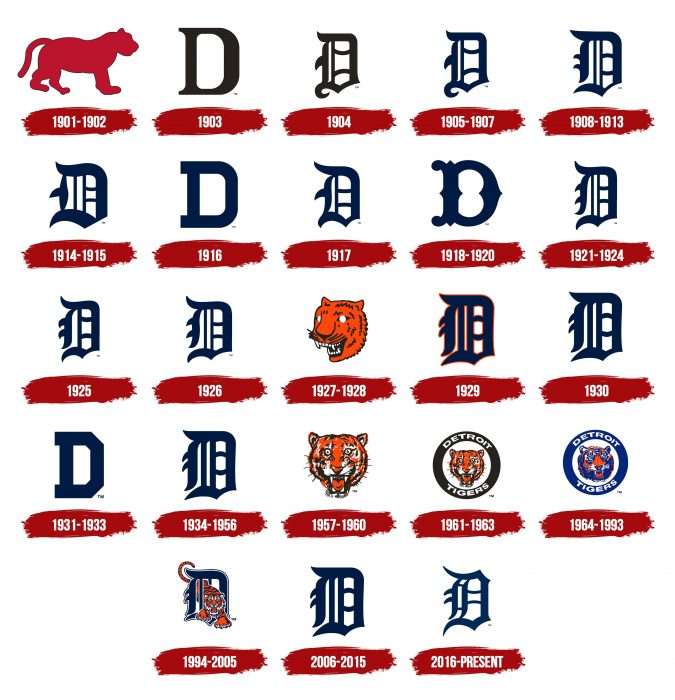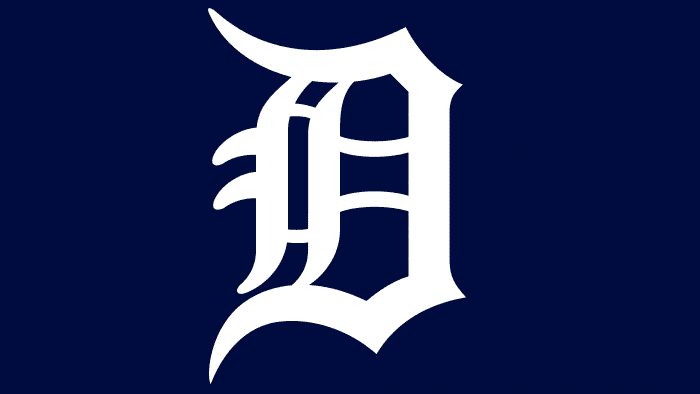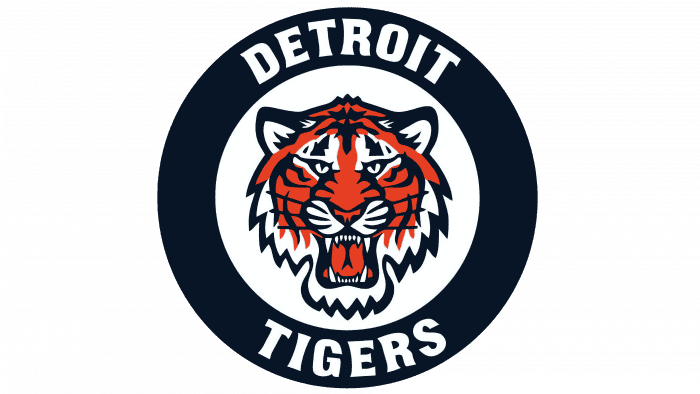The Detroit Tigers logo conveys a drive for leadership. Invincibility, power, readiness to snatch victory with their teeth – all are reflected in the emblem. Yet, the simple imagery is conveyed in a complex manner – in the format of a medieval sign or an Eastern ideogram to confuse opponents and prevent them from “reading” the team like an open book. In sports, the element of surprise is vital – a leap from a well-prepared ambush.
Detroit Tigers: Brand overview
| Founded: | 1894 |
| Founder: | Detroit, Michigan, U.S. |
| Headquarters: | Ilitch Holdings |
| Website: | mlb.com |
The Detroit Tigers are a professional baseball team based in Detroit, Michigan. The club competes in the Central Division of the American League of MLB. The Detroit Tigers are the oldest participant in the American League, with a history that dates back to 1894.
This is the longest-standing MLB club that has never changed its name or hometown. All relocations were confined within the same city. In the early days, the team was based in Boulevard Park but later moved to Bennett Park, which was constructed by the club owner George Vanderbeck in 1895.
A second relocation was anticipated in 1992 after Mike Ilitch purchased the club from local pizza magnate Tom Monaghan. However, the Tigers only moved to the newly built Comerica Park a few years later, in 2000.
The franchise’s name emerged somewhat naturally. Local press first called the team Detroit Tigers during a game at Bennett Park on April 13, 1896. But there are other versions of the name’s origin. According to one legend, a sports commentator compared the team’s 1901 victory to the ferocity of his alma mater’s club, the “Princeton Tigers.” Another suggests the baseball team was named after the 425th Infantry Regiment of the National Guard, which fought in the Civil and Spanish-American Wars and was known as the “Tigers.”
The Detroit Tigers logo with the Old English letter “D” is one of the most iconic logos in baseball history. Despite this, the letter initially looked a bit different, yet it denoted the city of Detroit. Over more than a century, the team’s logo has undergone eighteen changes, including twelve diverse letters “D.”
The modern logo is a modified dark blue Old English letter “D” with horizontal accents occupying the second vertical line. It appears modernistic and visually resembles the fangs of a tiger with its mouth wide open.
Although the franchise has always remained in Detroit, it has had many owners, precisely 13. The first owner was George Vanderbeck, who founded the club and managed it until 1900. Then, the team was owned by D. Burns (1901-1902), Samuel Angus (1902-1903), Bill Yawkey (1903-1908), Bill Yawkey, and Frank Navin (1908-1919), with Frank Navin as the sole owner (1919-1935).
After Frank Navin’s death, the team was controlled by Walter Briggs Sr. and Walter Briggs Jr. (1935-1952 and 1952-1956, respectively), Fred Knorr and John Fetzer (1956-1961), with John Fetzer as the sole owner (1961-1983). In late 1983, the franchise was sold to Tom Monaghan for $53 million. In 1992, the Detroit Tigers were bought by Mike Ilitch, who owned the club until 2017. Since 2018, the club has belonged to the Ilitch family trust.
Meaning and History
Twenty-three logos – that’s how many the Detroit Tigers have accumulated throughout their long history. Typically, changes were prompted by the leadership’s desire to improve the visual identifier, as the team never changed its name. Essentially, the emblem’s evolution is an evolution of complex forms. Periods alternated constantly: there were seasons dominated by graphical images, followed by text logos. Among them, only six featured tigers; the rest – the letter “D” in various executions.
What is Detroit Tigers?
The Detroit Tigers are a baseball team representing Michigan’s largest city since its founding in 1894. Since 1901, it has been part of the American League and plays in Major League Baseball. The athletes’ achievements are marked by numerous awards. Specifically, the club has won four AL Central championships, which it joined in 1998, and secured four World Series trophies.
1901 – 1902
At the beginning of the 20th century, most sports logos contained the team’s name or an initial letter, but the inaugural “Tigers” logo featured a red tiger.
1903
As a logo, the “Tigers” used the black letter “D,” representing the city of Detroit.
1904
The logo was replaced with an Old English variant of the letter “D” in dark brown.
1905 – 1907
Maintaining the same font as the previous logo, the new logo only changed in color; from this time, the “Tigers” used dark blue.
1908 – 1913
The Detroit Tigers logo still featured the Old English letter “D,” but thanks to a new font, it appeared more three-dimensional.
1914 – 1915
The Tigers continued to experiment with the letter “D,” now the dark blue letter was wider than ever.
1916
For the 1916 season, the team returned to the classic dark blue letter “D.”
1917
Another logo featuring an Old English letter “D,” the blue color remained unchanged.
1918 – 1920
The franchise introduced a new logo with the letter “D” written in the Bruce Double Pica font.
1921 – 1924
The “Tigers” returned to the Old English letter “D” in 1921. This time, it was thinner than in previous years.
1925
Minor changes occurred in 1925, but the color remained dark blue.
1926
The club chose another variant of the Old English letter “D” in blue, but the 1926 logo appeared more voluminous.
1927 – 1928
In 1927, the team first abandoned the letter “D” in its logo. The new emblem featured an orange tiger head with white eyes, black whiskers, and uneven white teeth.
1929
The team decided to return to the Old English letter “D,” which was used from 1921 to 1926. This time, the blue letter was trimmed with an orange outline.
1930
The “Tigers” abandoned the orange outline around the classic Old English letter “D.”
1931 – 1933
The blue letter “D” with a block returned. The franchise stayed with this logo for two years.
1934 – 1956
In 1934, the team decided to return to the blue Old English letter “D.” This logo lasted twenty-two years until it was completely changed in 1957.
1957 – 1960
The team ditched the Old English letter “D” in favor of a tiger’s head. The emblem featured an orange tiger’s head with a wide-open mouth. This time, the head was more detailed. Whiskers, eyes, mouth, and fur were depicted in black and white.
1961 – 1963
The next logo was based on the previous one, but the tiger’s head was reduced and placed inside a thick black ring, with the team’s hometown “Detroit” and name “Tigers” depicted on top and bottom, respectively. Both words were written in white.
1964 – 1993
In 1964, the “Detroit Tigers” introduced a new logo. They abandoned the black color and introduced blue into the emblem. Additionally, the tiger’s head started to lean to the right. The head was placed in a thick blue ring with the same words as in the previous design.
1994 – 2005
In 1994, designers decided to combine the tiger and the Old English letter “D.” The Detroit Tigers logo featured an aggressive tiger emerging from the letter “D” instead of the usual head.
2006 – 2015
In 2006, the franchise ditched the tiger, and the classic Old English letter “D” returned.
2016 – today
The modern logo version is a repetition of one of the past designs. Specifically, its prototype was introduced in 1904, and since then, it has become dominant. The basis was the Old English Latin alphabet – precisely how ancient signs were ornately designed. They were not printed but hand-drawn in calligraphic script, like Japanese ideograms.
The combination of curved, straight, and arc-shaped segments fits perfectly into the club’s concept. Firstly, they convey the name and location. Secondly, they symbolize the sharp fangs of a tiger. Such resemblance distinctively sets the logo apart and makes it recognizable.
Detroit Tigers: Interesting Facts
The Detroit Tigers are an old baseball team with many cool stories, famous players, and big wins.
- How They Started: The Detroit Tigers have been the Detroit Tigers since 1894, making them the oldest team in the American League to keep the same name and city.
- Championship Wins: They’ve won the World Series four times: in 1935, 1945, 1968, and 1984. Players like Hank Greenberg and Kirk Gibson did amazing things to help win these titles.
- Old Home: They played at Tiger Stadium from 1912 to 1999, a place loved by many because of its unique upper deck that hung over the field.
- New Home: In 2000, they moved to Comerica Park in downtown Detroit, known for its big outfield and a carousel with tigers.
- Ty Cobb: Ty Cobb played with the Tigers for 22 years and was one of the best, with a career batting average of .366.
- 1968 Season: Denny McLain won 31 games, a huge deal because no one’s done that since. They also won the World Series that year.
- 1984 Season: This team started the season super strong and won the World Series, led by great players like Jack Morris and Willie Hernández.
- Triple Crown Winners: Ty Cobb (1909) and Miguel Cabrera (2012) won the Triple Crown, leading in batting average, home runs, and RBIs.
- Amazing Pitching: Tigers pitchers have thrown seven no-hitters and one perfect game, with Jim Bunning pitching the perfect game in 1958.
- Honoring Greats: They’ve retired numbers for legendary players like Al Kaline and Hank Greenberg, showing respect for their history and stars.
The Detroit Tigers have a rich history of great players, big moments, and a strong connection to Detroit.
Font and Colors
The initial version is associated with a tiger. It is depicted calmly walking and without contours – only the general figure in a reddish color. The second version represents the English letter “D.” It was approved the following season. The third symbol is the corresponding letter of the Latin alphabet. These three forms received further development.
In the club’s history, both individual images and combined ones are found: for example, the logos from 1961 to 2005. During this period, developers created emblems in the form of seals, where the central element was a predatory animal, and the words were secondary.
Most changes concerned the English letter “D” in Latin script. Designers repeatedly elongated the lower part, doubled the vertical stripes, bent the ends of the lines, sharpened the short rays, etc.
The Detroit Tigers team chose the Old English font for their emblem. Thanks to a combination of many intricate details, one letter looks impressive and indicates the franchise’s age.
Although the official palette includes orange, dark blue, and white colors, only two are present in the modern logo. Orange is found only in emblems with a tiger.
Detroit Tigers color codes
| Midnight Navy Blue | Hex color: | #182d55 |
|---|---|---|
| RGB: | 24 45 85 | |
| CMYK: | 100 60 0 56 | |
| Pantone: | PMS 289 C |
| Orange | Hex color: | #f26722 |
|---|---|---|
| RGB: | 242 103 34 | |
| CMYK: | 0 65 83 0 | |
| Pantone: | PMS 172 C |
FAQ
What does the Detroit Tigers logo mean?
The logo featuring the Old English letter D represents the “Detroit Tigers,” or more precisely, the city it is based in. Moreover, the sharp lines of D look quite dangerous: they resemble the fangs and claws of the predator, after which the baseball club was named.
How did the “Detroit Tigers” get their name?
Some believe the name Detroit Tigers is a tribute to the Detroit Light Guard, nicknamed Tigers during the Civil War. Another legend links the word Tigers to the baseball players’ striped socks. According to a third version, sports commentators gave the club such a name, comparing its fierce play to the style of the Princeton Tigers (a team from Princeton University where one of the journalists studied).
What font is used in the Detroit Tigers logo?
The current Detroit Tigers logo consists only of the Old English letter “D.” Technically, this font is called Blackletter. It is also known as Textura, Fraktur, or Gothic minuscule. This writing style emerged around 1150. Of course, the baseball team’s logo does not use the original version of the font but a modified version adapted to the Detroit Tigers’ design standards.
What does the number 6 on the “Detroit Tigers” uniform mean?
In the 2020 season, all “Detroit Tigers” uniforms bore round dark blue or black patches on the sleeves with the white number 6. It is a tribute to baseball player Albert William Kaline, who stayed with the club even after retiring. He was a game commentator, manager’s assistant, advisor, and consultant. Al Kaline, nicknamed “Mr. Tiger”, passed away on April 6, 2020.





























